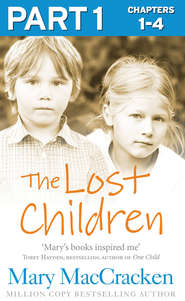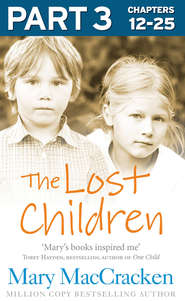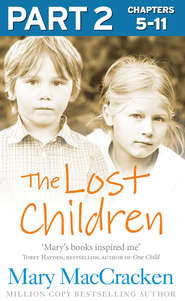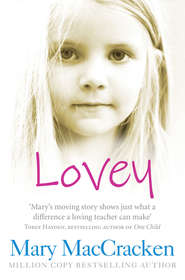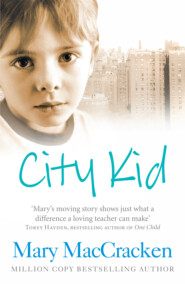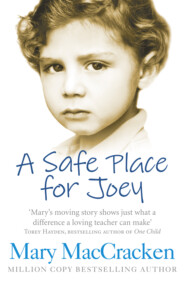По всем вопросам обращайтесь на: info@litportal.ru
(©) 2003-2024.
✖
The Lost Children
Настройки чтения
Размер шрифта
Высота строк
Поля
She left then before I could speak. Which was perhaps just as well. The only thing I could think to do was to look at Brad’s folder; perhaps I would regain some semblance of reality.
There it was. Brad. Bradford Turner. I checked the birth date. He was six years old.
My God, I thought, what kind of a class is this?
I was to find out later that this was the most difficult class I would ever teach, the hardest, the lowest-functioning. Four untoilet-trained boys, three of whom were nonverbal, ranging in age from five to eight. But I was unschooled – and while I knew it was somewhat different from Helga’s class, in my naïveté I thought, “Well, at least it’s a challenge. In a way, I’m lucky – there’s no way to go but up.”
Then in my mind’s ear I heard Helga’s voice, “You sound like a shitty Pollyanna. Get to work.” And I laughed out loud.
Louis was brought in by one of the women drivers and I recognized him immediately. If his name was not familiar to me, his blue football helmet was, and I remembered hearing the staff psychiatrist discussing him in Renée’s room. There was discussion as to whether he should be placed in her room for the remaining days. This would be his last year at the school; he was having multiple seizures now, sometimes as many as four or five in one hour. While it was never stated in words, most of us were sure these were epileptic in nature.
There was nothing much to do for Louis now except make sure his small football helmet was securely fastened to protect his head, should he fall beyond reach, and to cover him until he woke again after an attack. He was staying on at the school only until his parents could find a suitable residential setting for him. Some of the staff thought that it was wrong to keep him on in a school designed for the emotionally disturbed – wrong for him and an imposition on the teachers who had not been trained, and did not want to give the kind of custodial care Louis needed. But the Director wanted him there.
His parents had been strong supporters of the school, grateful and willing helpers, and the Director felt a loyalty and a responsibility to help them now. And right or wrong, if the Director wanted him there, he stayed. So the problem had been temporarily resolved by moving Louis from Renée’s room to Joyce’s. Joyce was more tolerant, her room more removed, and Louis’s unnamed but ever-increasing seizures were less noticeable and distracting to the other children and teachers …
Louis’s driver hands me his bib and an extra set of clothing and says, “Had a seizure on the way over. Went stiff – then right out – but he came to soon enough. Seems all right now.”
I take off his hat and coat and he climbs upon the jumping-jack rocking horse and starts the motion that he will keep up all day unless he is lifted off – up and down, up and down – the springs beneath him groaning under the weight of his eight-year-old body. Saliva runs down his chin and I wipe it with the first of many Kleenexes and say, “Good morning, Louis,” but his blue eyes do not focus and the motion does not stop – up and down, up and down. I wonder if there is such a thing as mental masturbation.
Someone crashes against the door and I open it to Tom, the boy who ran down the stairs so many eons ago when I was first searching for Helga’s classroom. Tom is a tall, frail boy with wispy black hair falling across his eyes. All his shirts and sweaters have turtlenecks, which he unfolds and pulls up over his chin and eyes whenever a situation grows too threatening.
Tom has a bell in one hand; the other is behind his back. He emerges from the turtleneck, clangs the bell, and shouts, “Circle time!”
“Thank you,” I answer. “Good morning, Tom.”
“Good morning, Tom,” he replies, and leaves us.
Circle time. The formal day at the school began with Circle each morning. It was the only time during the day when the Director observed all of us closely and noted the relationship between child and teacher, teacher and teacher, and improvements and lapses in each child. At the beginning of Circle we all sang to each child, singling him out, making him special, and on Wednesday afternoons at staff meetings there would be references to how the child acted. Group singing followed the individual greeting, and then the galloping and skating exercises and other games, which the Director said were designed for “gross motor development.” These were followed by more social, nursery-school-type games where the children chose partners and again the Director watched for “peer relationships.”
It was a warm and friendly time. Most teachers had aides assigned to them and the aides arrived as Circle began, so that the ratio of child to adult was two to one.
And now it is time, the first time, for me to take my own class to Circle. But so far there are only three children. Where is my other one? Billy. Well, perhaps his was one of the phone calls; perhaps the weather or a cold has kept him home.
I survey my three: Chris on the top of the jungle gym, Brad sitting placidly on the floor bulging like a Buddha because of his many diapers, Louis up-and-downing it on the rocking horse. How do I gather these three and get them down the long hall to the room where Circle is held?
I stand beside the jungle gym. “Circle time, Chris. Let’s go.”
He spreads himself flat and laughs his silver laugh. I climb seven rungs until I can reach the platform, and then lift his slack body down beside me. How can he be so heavy when he is so small? But at least he does not seem inclined to run, and lets me hold his hand. With the other hand I disentangle Louis from the rocking horse and support him against my side. Now Brad – how to get him there? Lacking alternatives, I simply say once again, “Circle time, Brad. Come on now.” And surprisingly he stirs. He rocks forward until he can push against the floor with his hands, pushes himself up to a standing position, and then he willingly waddles to me and holds my skirt – and we are off down the hall toward Circle.
The others are already there. Twelve more children; quite a few must be absent because I know there are twenty-four children in the school, and five other teachers, one for every four children. They call across the room, introducing themselves to me – Susan, small and blond; Renée; Carolyn, tall, black-haired, beautiful; Ruth, red-haired with glasses; and Dan, a new male teacher replacing Nick, blue eyes, strong-looking in a khaki shirt. The Director smiles from in front of the piano and I maneuver my three to the small chairs in the Circle. The Director motions to a woman on the side of the room who comes and sits next to Louis and so I put Brad and Chris on either side of me.
The singing starts, all the teachers and some of the children joining voices – the Director plays the piano, leading us.
“Good morning to you,
Good morning to you,
Good morning, dear Louis,
We’re glad to see you.”
I reach across Brad and touch Louis’s shoulder as we sing to him – the blue eyes are marbles, and the woman beside him wipes his chin.
We sing to Brad and I smile down at him and take his pudgy hand and touch his bulging stomach with it, and he beams up at me – brown curls, rosy cheeks, brown eyes, a beautiful child, but how can he manage to look only two years old when he is six? No time to think now. It’s Chris’s turn. He decides that he must leave his chair and sit on me – he winds his arm tight, tight, around my neck. From across the room it must look as though he’s hugging me affectionately, and the teachers smile approvingly at this sign of rapport. Only I can feel his sharp fingernails as he pinches the skin below my ear, pinches hard, and I lift him back to his chair and my hand holds him there as we finish the song … “Good morning, dear Chris, I’m glad to see you.”
I soon saw why there had been no lesson plan. There was no one to do lessons. Nor was there time. The day was consumed with eating and eliminating. Circle took approximately forty-five minutes; when it was over, the classes went to the bathroom. My class changed its diapers. The Director told me this as the other children left the room and I nodded, still filing away the picture of that morning’s Circle in my mind. It had not changed much since the first day I visited: although some of the children were different, they were still beautiful; although Helga was no longer there, the strength and the loving were.
As we made our slow trek back to our classroom, we passed the furnace room where Zoe, chief cook and bottle washer, secretary, public relations expert, and the Director’s right hand, was beginning to heat a frozen casserole in the electric warming cart.
We were just rounding the corner, Chris and Louis holding my hands, Brad waddling behind, when I heard Zoe say, “Jesus, cut that out, Franklin!”
“Aw, come on, Zoe, one quick one. I never did it in a furnace room, did you?”
That must be that new teacher, I thought, Dan Franklin. Zoe called everybody by their last name.
“Go on, get out now. Quit kidding around.” But there was laughter behind her voice.
“Okay. All right. I’ll catch you later then. Incidentally, who’s the new teacher with Joyce’s class? Where’d she come from!”
“Came from the Junior League. One of the volunteers.”
“The Junior League? You’re kidding? Jeez! Well, Zoe, I’ll bet ‘Junior League’ doesn’t last a week. I’ll lay a meatball on it.”
“Okay, you’re on, Franklin. She’s better than you think. I saw her work with Helga last year.”
Billy was my fourth child. He was the youngest in the class, just five, with blond, wavy hair and a soft, unformed face with a rosy, puckered mouth and, like the others, not toilet trained. His mother was young, separated from her husband, and she would bring Billy to school an hour or so late each morning. The Director spoke to her about this, then Dr. Steinmetz, the psychologist, finally Vic Marino, our psychiatrist, each explaining how important the schedule, the routine, was for Billy, how necessary the regular scheduling … and she would agree – and then the next morning come as late as usual – or later – dark, bruised hollows beneath her eyes.
It was hard not knowing what happened to the children when they left school. They did not speak, and so there was no way to learn from them.
Helga had been sure some of them were physically abused, and told me of visiting one family unannounced and finding the boy chained to a doghouse in the high-fenced backyard, his food and water on the ground.
But if some parents were cruel, others were kind and devoted, making unbelievable sacrifices for the special child within their home. Schizophrenic children are classically poor sleepers, refusing to go to bed, haunted by nightmares; and often the parents slept in shifts, keeping watch over the child who controlled their home. This schedule slowly eliminated sexual relations or even friendship between the parents. The children could be tyrants, and their houses could become filled with the hate common to tyranny.
To me the amazing thing was that the parents managed as well as they did – and that any teacher or outsider would presume to judge them. After all, we worked with the children five hours each day, from nine-thirty in the morning until two-thirty in the afternoon; but the parents were with them the other nineteen hours without relief as they tried to care for their children and accomplish other chores as well. I felt compassion and admiration for their courage, and I often longed to reach out and put my arms around them as well as the children – not so much to care for them as to say what I could not put into words. I was not sure that I would have been as strong as they, had a child such as this been born to us. For more and more it seemed to me that there must be a chemical imbalance in at least some of these children – and who could say which ones?
But my job was not research. While I might hope for answers from the laboratories, still there was this day, this hour, when answers had not yet been found and my own job was teaching. I believed then and I believe still in the day school for emotionally disturbed children. There are valid reasons and occasions for residential settings, but whenever possible I believe the child is better at home with his parents. However, if the child is to go home to these parents each afternoon, then parent and teacher must try to work together.
And this was often difficult. To begin with, many of these parents had been hurt so often, lied to so much, accused of so many things, that their own defenses were high – or their own hopes had been abandoned and they had settled into what was easiest.
With Brad, for example, it was difficult for his mother to agree to leave the baby bottles and diapers home; and it was an important day for both of us when she brought me six pairs of white cotton training pants for him as a gift.
For I had set my goals. I was not a psychiatrist or even a trained teacher yet, but I was a mother and I had raised my own children. It seemed to me that if in those weeks while Joyce was absent I could teach the children to take care of their bodily needs – eat, go to the bathroom by themselves, dress themselves – and to communicate a little, I would have helped.
Zoe told me later how impossible my goals were – but because I was new, alone in my room at the far end of the hall, and had no one to tell me otherwise, I did not know it.
And so I bought five small plastic glasses and began. Each day after Circle we sat at the pink table and drank juice and ate cookies. At first they tipped over the glasses, dumped the juice upon the floor, threw the cookies; but they liked the sweet apple juice and the soft sugar cookies, and I would not let them have them unless they sat with me at the table. I wanted them to get the feeling of having a place where they felt safe. I knew no better way than to feed them there.
We also stripped. There alone in our bare classroom I took off their clothes. Not Louis – even I knew that he had left us, was now beyond reaching. But I took off the clothes of the other three piece by piece and taught them to put them back on by themselves. For a half hour or more each morning we worked on learning to get dressed and undressed. I took off three pairs of shoes, three pairs of jeans, three pairs of diapers. I laid out three pairs of cotton training pants – one on Brad’s chair, one on Billy’s, one on Chris’s. I worked with whichever one I could capture first, sitting him on the floor in front of his chair, guiding his hand to the underpants, then pushing him forward, laying the pants out on the floor in front of him, then bending first the right leg, aiming the right foot for the proper hole, then the left leg.






